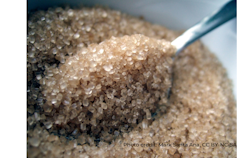
Ripe berries and sugar crystals are both sweet, but one offers much more than just calories. Chris George/PhotoPlus Magazine/Future via Getty Images
One of my patients — who had been struggling with obesity, uncontrolled diabetes and the cost of her medications — agreed in June 2019 to adopt a more whole-food plant-based diet.
Excited by the challenge, she did a remarkable job. She increased her fresh fruit and vegetable intake, stopped eating candy, cookies and cakes and cut down on foods from animal sources. Over six months, she lost 19 pounds and her HbA1c — a measure of her average blood sugar — dropped from 11.5% to 7.6%.
She was doing so well, I expected that her HbA1c would continue to drop and she would be one of our plant-based successes who had reversed diabetes.
Her three-month follow-up visit in March 2020 was canceled because of COVID-19 lockdowns. When I eventually saw her again in May 2021, she’d regained some of the weight and her HbA1c had climbed to 10.4%. She explained that her diabetes doctor and a diabetes nurse educator had told her that she was eating too much “sugar” on the plant-based diet.
She’d been advised to limit carbohydrates by cutting back on fruits and starchy vegetables and eating more fish and chicken. Sugar-free candy, cakes, cookies and artificial sweeteners were encouraged. In the face of conflicting medical advice, she fell back on conventional wisdom that “sugar” is bad and should be avoided whenever possible, especially if you have diabetes.
I’m a physician, board certified in preventive medicine with a lifestyle medicine clinic at Morehouse Healthcare in Atlanta. This emerging medical specialty focuses on helping patients make healthy lifestyle behavior modifications. Patients who adopt whole-food plant-based diets increase carbohydrate intake and often see reversal of chronic diseases including diabetes and hypertension. In my clinical experience, myths about “sugar” and carbohydrates are common among patients and health professionals.
Fruit vs. sugar
Your body runs on glucose. It is the simple sugar that cells use for energy.

These molecules are the three kinds of simple sugars, found in starches, fruit and milk. Trinset/ iStock via Getty Images Plus
Glucose is a molecular building block of carbohydrates, one of the three essential macronutrients. The other two are fat and protein. Starches are long, branching chains of glucose.

Chains of simple sugar molecules linked together form starches and other carbohydrates. Trinset/iStock via Getty Images Plus
Naturally occurring carbohydrates travel in nutrient-dense packages such as fruits, vegetables, whole grains, nuts and seeds.
Humans evolved to crave sweet tastes to get the nutrients needed to survive. A daily supply of vitamins, minerals and fiber is needed because our bodies cannot make them. The best source of these substances for our ancient ancestors was sweet, ripe, delicious fruit. In addition, fruits contain phytonutrients and antioxidants, chemicals produced only by plants. Phytonutrients such as ellagic acid in strawberries have cancer-fighting properties and promote heart health.
Refined sugars, on the other hand, are highly processed and stripped of all nutrients except calories. They’re a concentrated form of carbohydrates. The food industry produces refined sugars in many forms. The most common are sucrose crystals, which you’d recognize as table sugar, and high-fructose corn syrup, which is found in many processed foods and sweetened beverages.
If you continually satisfy your taste for sweet with foods that contain refined sugar — rather than the nutrient-rich fruits at the core of this craving passed on by evolution — you may not get all the nutrients you need. Over time, this deficit may create a vicious cycle of overeating that leads to obesity and obesity-related health problems. Women who eat the most fruit tend to have lower rates of obesity.
Sugar toxicity
Refined sugars are not directly toxic to cells, but they can combine with proteins and fats in food and in the bloodstream to produce toxic substances such as advanced glycation end products (AGEs). High blood glucose levels may produce glycated low-density lipoproteins. High levels of these and other glucose-related toxic substances are associated with an increased risk of a wide range of chronic health problems, including cardiovascular disease and diabetes.
[You’re smart and curious about the world. So are The Conversation’s authors and editors. You can read us daily by subscribing to our newsletter.]
The disease most commonly associated with sugar is Type 2 diabetes. A surprising number of people, including health professionals, incorrectly believe that eating sugar causes Type 2 diabetes. This myth leads to a focus on lowering blood sugar and “counting carbs” while ignoring the real cause: progressive loss of pancreatic beta cell function. At diagnosis, a patient may have lost between 40% and 60% of their beta cells, which are responsible for producing insulin.
Insulin is a hormone that controls how much glucose is in the bloodstream by blocking glucose production in the liver and driving it into fat and muscle cells. Loss of beta cell function means not enough insulin gets produced, resulting in the high blood glucose levels characteristic of Type 2 diabetes.
Beta cells have low levels of antioxidants and are susceptible to attack by metabolic and dietary oxidized free radicals and AGEs. Antioxidants in fruit can protect beta cells. Researchers have found that eating whole fruit decreases the risk of Type 2 diabetes, with those who eat the most fruit having the lowest risk.

As you consume less refined sugar, you may notice more nuance in fruits’ flavors. Brianna Soukup/Portland Portland Press Herald via Getty Images
Detoxing from sugar
People interested in losing weight and improving health often ask if they should do a “sugar detox.” In my opinion this is a waste of time, because it is not possible to eliminate sugar from the body. For instance, if you ate only baked chicken breasts, your liver would convert protein to glucose in a process called gluconeogenesis.
Low-carb diets may lead to weight loss, but at the expense of health. Diets that significantly reduce carbohydrates are associated with nutrient deficiencies and higher risk of death from any cause. On low-carbohydrate ketogenic diets the body will break down muscles and turn their protein into glucose. The lack of fiber causes constipation.
Eliminating foods sweetened with refined sugar is a worthy goal. But don’t think of it as a “detox” – it should be a permanent lifestyle change. The safest way to go on a refined sugar “detox” is to increase your intake of nutrient-dense fruits and vegetables. Once you eliminate refined sugar, you’ll likely find that your taste buds become more sensitive to — and appreciative of — the natural sweetness of fruits.

This article is part of a series examining sugar’s effects on human health and culture. You can read the articles on theconversation.com.
Jennifer Rooke works for Morehouse School of Medicine. This is stated in the article.
This article is republished from The Conversation under a Creative Commons license.
6 grocery items that experts say will get more expensive in 2022
Climbing food costs

Empty shelves dot the dairy cases in a grocery store in Englewood, Colo., as food supplies have been tight since the start of the pandemic.
The pandemic might have stopped us from traveling or hanging out in large groups, but we still have to eat. And thanks to the coronavirus, that could be getting more expensive.
According to the health and wellness site Eat This, Not That, supply chain issues, labor shortages and overall high demand across the country have been said to contribute to an impending consumer price hike.
To help consumers better prepare, the site found six staple foods that will see a price increase in 2022.
Steaks

CNBC reported that beef and veal prices have risen by 20.1% during the past year. It suggested the pandemic caused a major slowdown in beef production that extends to all types of meat, including seafood and pork.
President Joe Biden has met virtually with independent farmers and ranchers to discuss initiatives to reduce food prices by increasing competition within the meat industry.
The “consumer demand for meat and poultry products has never been higher,” Julie Anna Potts, president and CEO of the Meat Institute, said in a December press release. “Members of the Meat Institute are producing more meat than ever before under extraordinary circumstances to keep our farm economy moving and to put food on American’s tables.”
Chicken

Chicken prices also increased during the pandemic, although not as much as steak.
In a December 2021 news release, National Chicken Council president Mike Brown addressed the reason behind chicken’s increased price. “A 9 percent year over year price increase for chicken is barely outpacing inflation … on top of a labor shortage,” he said. “It’s Economics 101.”
When you throw in truck driver shortages and shipping delays, Eat This, Not That wrote, it’s a safe bet that chicken prices will continue to climb.
Mayonnaise

The Wall Street Journal reported that Kraft Heinz Co. is set to tell “customers that it would raise prices across many of its products … with some items going up as much as 20%.” Shoppers should be prepared since the price of mayo is set to change very soon, Eat This, Not That wrote.
Eggs

In November, CNN reported egg prices had increased 11.6% over the previous year.
"We’ve chosen to increase our prices for the time being. We recognize that this is a difficult time for everyone, and higher grocery bills can only contribute to that,” organic egg company Pete and Gerry’s said when addressing its price increase. “In the egg world, the cost of high-quality organic ingredients for our hens’ supplemental feed has reached an all-time high.”
The company noted that it was led “to make some difficult decisions” because of the pandemic’s strain on operations, which is still going on.
Cereal

The price of a box of cereal was 5% higher in the fall of 2021 than in fall 2020. CNN reported that in a letter to a wholesale supplier, General Mills stated it will raise prices on a number of items, including “Cheerios, Cinnamon Toast Crunch, Lucky Charm’s, Wheaties, Reese’s Puffs, Trix and more.”
The price hike is expected sometime this month.
Vegetables

Potatoes sit on a rack at a supermarket in Des Moines, Iowa.
“Potatoes, celery and other heavier vegetables will have higher price tags next year in part because of higher freight costs,” the Wall Street Journal reported in December.
The reason for increases, Mashable explained, is because the COVID-related issues other companies are facing are “still wreaking havoc on the food industry” and will for a while.
"fruit" - Google News
January 19, 2022 at 08:32AM
https://ift.tt/3GJ5VCS
Sugar detox? Cutting carbs? A doctor explains why you should keep fruit on the menu - Buffalo News
"fruit" - Google News
https://ift.tt/2pWUrc9
https://ift.tt/3aVawBg
Bagikan Berita Ini














0 Response to "Sugar detox? Cutting carbs? A doctor explains why you should keep fruit on the menu - Buffalo News"
Post a Comment